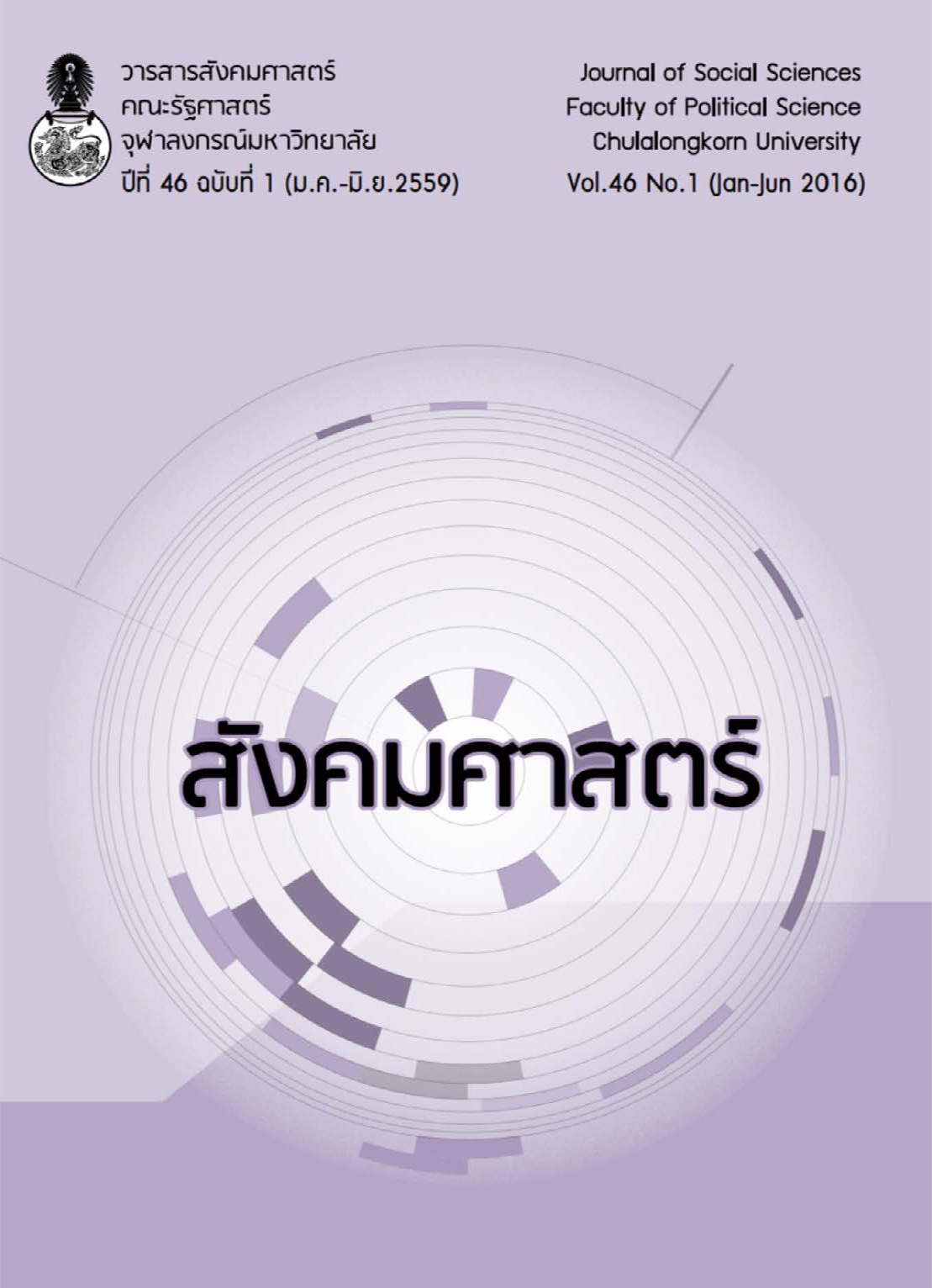ความท้าทายของรัฐอาเซียนในการต่อต้านอาชญากรรมข้ามชาติ
DOI:
https://doi.org/10.61462/cujss.v46i1.1155คำสำคัญ:
อาชญากรรมข้ามชาติ ความร่วมมือระหว่างประเทศ การบังคับใช้กฎหมายบทคัดย่อ
บทความนี้มีวัตถุประสงค์เพื่อสำรวจแนวคิดเกี่ยวกับอาชญากรรมข้ามชาติซึ่งเป็นภัยคุกคามความมั่นคงรูปแบบใหม่ที่ส่งผลกระทบต่อรัฐและสังคมโลก รวมถึงภูมิภาคเชียตะวันออกเฉียงใต้ซึ่งจะรวมตัวเป็นประชาคมเศรษฐกิจอาเซียนอย่างเต็มรูปแบบในปี พ.ศ.2559 จากการศึกษาพบว่า อาชญากรรมข้ามชาติมีลักษณะที่แตกต่างจากอาชญากรรมปกติที่ไม่สามารถอธิบายได้ด้วยแนวคิดอาชญาวิทยาแบบดั้งเดิมได้อย่างสมบูรณ์ หากแต่ต้องคำนึงถึงปัจจัยแวดล้อมทั้งทางเศรษฐกิจ สังคมและการเมือง อันทำให้การจัดการกับปัญหาดังกล่าวจำเป็นต้องบูรณาการแนวคิดใน 3 ด้าน ประกอบด้วย รัฐศาสตร์ นิติศาสตร์ และอาชญาวิทยา เพื่อให้สามารถอธิบายการจัดการปัญหาอาชญากรรมข้ามชาติได้อย่างครอบคลุมโดยหน่วยงานบังคับใช้กฎหมายที่เกี่ยวข้องของแต่ละประเทศต้องนำกลไกความร่วมมือที่มีอยู่ในระดับประเทศ ระดับภูมิภาค และระดับระหว่างประเทศที่มีอยู่ไปใช้ทำงานร่วมกันให้เกิดประโยชน์สูงสุดเพื่อให้สามารถตอบโต้อาชญากรรมข้ามชาติได้อย่างเป็นรูปธรรมและเกิดประสิทธิภาพสูงสุด
Downloads
เอกสารอ้างอิง
Albanese, Jay. 2011. Transnational organized crime. In International crime and justice, ed. Mangai Natarajan. Cambridge: Cambridge University Press.
Basu, Guatam. 2014. Combating illicit trade and transnational smuggling: Key challenges for customs and border control agencies. World Customs Journal 8(2): 15-26
Boer, Monica den. 2011. Transnational policing. In Handbook of transnational governance: Institutions and innovations, eds. Thomas Hale, and David Held. Malden, MA: Polity Press.
Brownlie, Ian. 2003. Principles of public international law. 6th ed. Oxford: Oxford University Press.
Cope, Stephen. 2001. Analysing criminal justice policy-making: Towards a policy networks approach?. In Policynetworks in criminal justice, eds. M. Ryan, S. Savage, and D. Wall. New York: Palgrave.
Han, L.W. 2002. Confronting transnational crime in Asia Pacific. In Asia Pacific security uncertainty in a changing world order. Paper presented at 16th Asia-Pacific Roundtable, 2-5 June 2002, ed. Noor H. Elina,Kuala Lumpur: ISIS Malaysia.
Johnson, R.J. 1998. Barrier to transnational policing. International Police Review 10(November/December): 28-30.
Joutsen, Matti. 2011. The European Union and judicial cooperation. In International crime and justice, ed. Mangai Natarajan. Cambridge: Cambridge University Press.
Keohane, Robert. 2005. After hegemony: Cooperation and discord in the world politicaleconomy. Princeton, NJ: Princeton University Press.
Krasner, Stephen D. 1983. International regimes. London: Cornell University Press.
MacFarlane, John. 2002. Fighting transnational crime: Building for the future. In Asia Pacifific security uncertainty in a changing world order, ed. Noor H. Elina. Papers presented at 16th AsiaPacifif ific Round Table. Kuala Lumpur: ISIS.
MacGibbon, Alastair. 1997. Multilateral initiatives to combat transnational criminality. CACAP Study Group on Transnational Crime. at Siam Intercontinental Hotel, Bangkok, Thailand. October 10-11,1997.
McDonald, William F. 2011. The longer arm of the law: The growth and limits of international law enforcement and criminal justice cooperation. In International crime and justice, ed. Mangai Natarajan. Cambridge: Cambridge University Press.
Miraglia, Paula, Rolando Ochoa, and Ivan Briscoe. 2012. Transnational organised crime and fragile states. OECD Development Co-operation Working Paper. http://www.crime-prevention-intl.org/fileadmin/user_upload/Publications/ Transnational_organised_crime_and_fragile_states_2012.pdf. (Accessed on October 16, 2013)
Okubo, Shiro and Louise Shelley, eds. 2011. Human security, transnational crime and human trafficking: Asian and Western perspectives. London: Routledge.
Public Affairs Division, Royal Thai Police. 2015. Administration centre of arrangement for ASEAN community. Police for People Journal 84: 20-22.
Sauterey, Anne-Lise. 2008. Anti-trafficking regional cooperation in Southeast Asia and the global linkages from geopolitical perspective: Borders and anti-trafficking strategies between Burma, Laos PDR and Thailand. Paper presented at a Seminar on Trafficking and Smuggling organized by the Institute of Asian Studies of Chulalongkorn University, Bangkok, Thailand. May 12th, 2008.
Shelley, Louise, John Paparelli, and Chris Corpora. 2011. In Beyond sovereignty: Issues for global agenda, ed. Cusimano L. Maryann. 3rd ed. Boston: Wadsworth.
Singh, J. 1999. Strategic impact of transnational crime. In Transnational crime and regional security in the Asia Pacific, eds. C.G. Hernandez, and G.R. Pattugalan. Manila: Institute for Strategic and Development Studies, Inc.
Stiglitz, Joseph E. 2002. Globalization and its discontents. New York: W.W.Norton & Company.
Viano, Emilio C. 2009. Globalization, transnational crime and state power: The need for a new criminology. Rivista di Criminologia, Vittimologia e Sicurezza 3(3): 63-85.
Voronin, Yuriy A. 2000. Measures to control transnational organized crime. Washington D.C.: the U.S. Department of Justice.
Williams, Phil. 1994. Transnational criminal organizations and International Security. Survival 36(1): 96-113.
ดาวน์โหลด
เผยแพร่แล้ว
รูปแบบการอ้างอิง
ฉบับ
ประเภทบทความ
สัญญาอนุญาต
ลิขสิทธิ์ (c) 2016 คณะรัฐศาสตร์ จุฬาลงกรณ์มหาวิทยาลัย

อนุญาตภายใต้เงื่อนไข Creative Commons Attribution-NonCommercial-NoDerivatives 4.0 International License.
เงื่อนไขการอนุญาตสาธารณะ
นโยบายลิขสิทธิ์และการอนุญาต
วารสารสังคมศาสตร์ จุฬาลงกรณ์มหาวิทยาลัย เผยแพร่เนื้อหาทั้งหมดภายใต้ สัญญาอนุญาตครีเอทีฟคอมมอนส์แบบแสดงที่มา-ไม่ใช้เพื่อการค้า-ไม่ดัดแปลง 4.0 นานาชาติ (CC BY-NC-ND 4.0)
ลิขสิทธิ์
บทความทั้งหมดที่ตีพิมพ์ในวารสารสังคมศาสตร์ จุฬาลงกรณ์มหาวิทยาลัย เป็นลิขสิทธิ์ของ คณะรัฐศาสตร์ จุฬาลงกรณ์มหาวิทยาลัย ผู้เขียนจะโอนสิทธิ์ทั้งหมดให้แก่วารสารเมื่อบทความได้รับการตอบรับให้ตีพิมพ์
สัญญาอนุญาต CC BY-NC-ND 4.0
ภายใต้สัญญาอนุญาตนี้:
-
แสดงที่มา (BY): ผู้ใช้ต้องแสดงที่มาโดยอ้างอิงถึงผู้เขียน คณะรัฐศาสตร์ จุฬาลงกรณ์มหาวิทยาลัย และวารสารสังคมศาสตร์ จุฬาลงกรณ์มหาวิทยาลัย พร้อมทั้งให้ลิงก์ไปยังสัญญาอนุญาต และระบุหากมีการเปลี่ยนแปลง ทั้งนี้สามารถทำได้ในลักษณะที่สมเหตุสมผล แต่ต้องไม่ทำในลักษณะที่แสดงว่าผู้อนุญาตให้การรับรองผู้ใช้หรือการใช้งานดังกล่าว
-
ไม่ใช้เพื่อการค้า (NC): ผู้ใช้ไม่สามารถใช้เนื้อหาเพื่อวัตถุประสงค์ทางการค้า การใช้งานเชิงพาณิชย์จะต้องได้รับอนุญาตเป็นลายลักษณ์อักษรล่วงหน้าจากผู้เขียนและคณะรัฐศาสตร์ จุฬาลงกรณ์มหาวิทยาลัย
-
ไม่ดัดแปลง (ND): หากผู้ใช้นำเนื้อหาไปรวม ดัดแปลง หรือต่อยอด ผู้ใช้ไม่สามารถเผยแพร่งานที่ดัดแปลงนั้นได้ การดัดแปลงผลงานจะต้องได้รับอนุญาตเป็นลายลักษณ์อักษรล่วงหน้าจากผู้เขียนและคณะรัฐศาสตร์ จุฬาลงกรณ์มหาวิทยาลัย
นโยบายการเข้าถึงแบบเปิด
วารสารสังคมศาสตร์ จุฬาลงกรณ์มหาวิทยาลัย ให้การเข้าถึงเนื้อหาแบบเปิดโดยทันทีตามหลักการที่ว่าการทำให้งานวิจัยสามารถเข้าถึงได้อย่างเสรีแก่สาธารณะจะสนับสนุนการแลกเปลี่ยนความรู้ในระดับโลก ผู้ใช้สามารถอ่าน ดาวน์โหลด คัดลอก เผยแพร่ พิมพ์ ค้นหา หรือเชื่อมโยงไปยังเนื้อหาฉบับเต็มของบทความได้โดยไม่ต้องขออนุญาตล่วงหน้าจากผู้จัดพิมพ์หรือผู้เขียน ทั้งนี้เป็นไปตามสัญญาอนุญาต CC BY-NC-ND 4.0
นโยบายการเก็บบันทึกด้วยตนเอง
ผู้เขียนสามารถเก็บบันทึกบทความฉบับตีพิมพ์สุดท้าย ต้นฉบับที่ส่ง (preprint) หรือฉบับที่ผ่านการประเมิน (postprint) ในคลังสถาบันหรือเว็บไซต์ส่วนตัวได้ โดยต้องมีการอ้างอิงการตีพิมพ์ครั้งแรกในวารสารสังคมศาสตร์ จุฬาลงกรณ์มหาวิทยาลัย พร้อมระบุแหล่งอ้างอิงที่สมบูรณ์และลิงก์ไปยังเว็บไซต์ของวารสาร
การขออนุญาต
สำหรับการใช้งานนอกเหนือจากที่ครอบคลุมโดยสัญญาอนุญาต CC BY-NC-ND 4.0 กรุณาติดต่อ:
กองบรรณาธิการ
วารสารสังคมศาสตร์ จุฬาลงกรณ์มหาวิทยาลัย
คณะรัฐศาสตร์ จุฬาลงกรณ์มหาวิทยาลัย
Email: cusocscij@gmail.com
สำหรับข้อมูลเพิ่มเติมเกี่ยวกับสัญญาอนุญาตครีเอทีฟคอมมอนส์แบบแสดงที่มา-ไม่ใช้เพื่อการค้า-ไม่ดัดแปลง 4.0 นานาชาติ กรุณาเยี่ยมชม: https://creativecommons.org/licenses/by-nc-nd/4.0/deed.th





